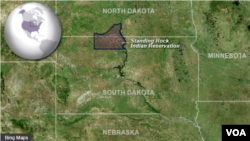One evening a week, young and old gather in Michael Moore’s classroom in Fort Yates, North Dakota, to learn Lakota — the language of their Sioux tribal ancestors.
For many of the students here at Sitting Bull College, it's a tongue their great grandparents spoke fluently at home.
But that changed in the early 1900’s, when thousands of Native American children were sent to boarding schools where they were told to assimilate, learn English and forget all aspects of their native culture.
Gabe Black Moon, who co-teaches Lakota with Moore, remembered his time at one such school.
“The government punished [us for speaking] our language, and I've seen that happen. It happened to me," he said. "Day one, I went to school, I couldn’t speak English. I got punished pretty bad.”
Presidential recognition
Renewed efforts to preserve Lakota for future generations received national recognition earlier this year when President Barack Obama visited Standing Rock Native American Reservation, where he praised Sioux tribal leaders’ for revitalizing the endangered tongue.
One of the few Sioux Indians left who speaks fluent Lakota, Black Moon said he now devotes his days to making sure the language doesn't die out with his generation.
He said heartened to see younger generations learning to communicate in precisely the manner from which their own parents were discouraged from speaking.
Speaking Lakota
One such student, Tiffany Baker, said she decided to learn Lakota to talk with her two-year-old daughter, who is in an immersion program at the college.
She said her own father rarely spoke Lakota.
“As the elders start passing away, they are taking all their knowledge that they have," she said, describing that class as vital to reclaiming a part of their culture that was nearly lost. "It’s up to us to learn it so that we can carry it on.”
As the White House prepares to host more than 500 tribal representatives for an annual conference in Washington on December 3, it's hoped cultural preservation programs of exactly this kind will receive further acknowledgement and support.







